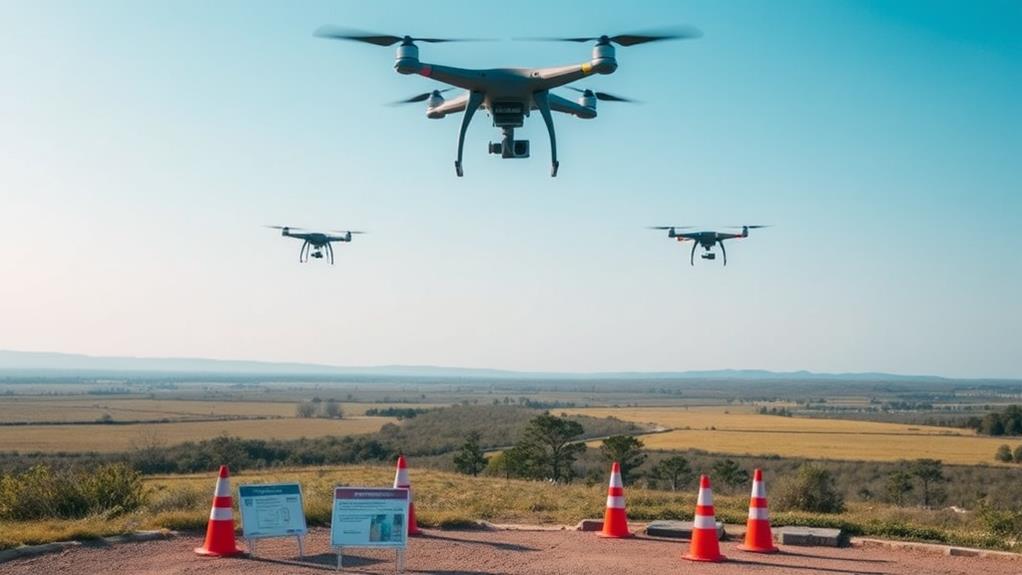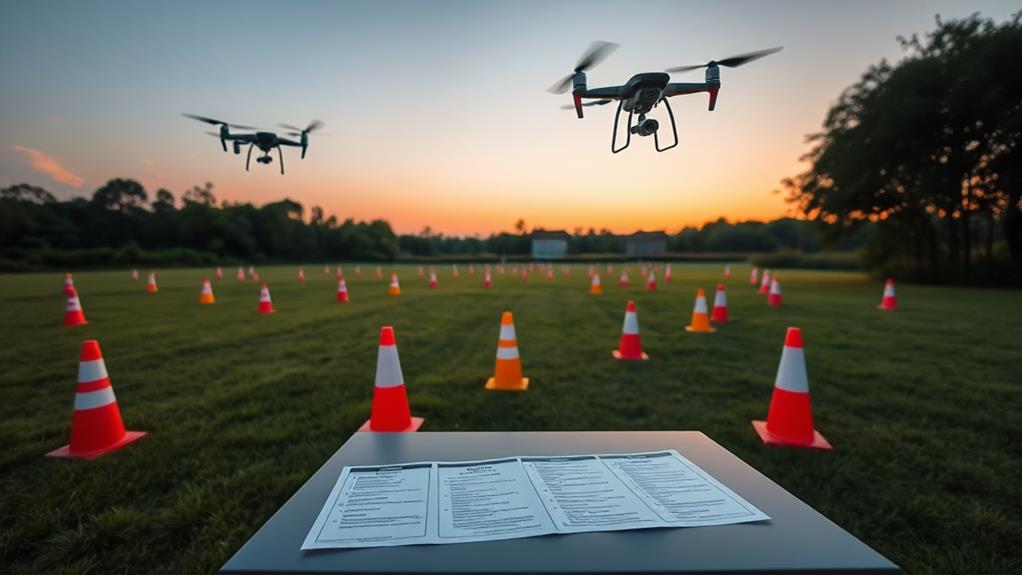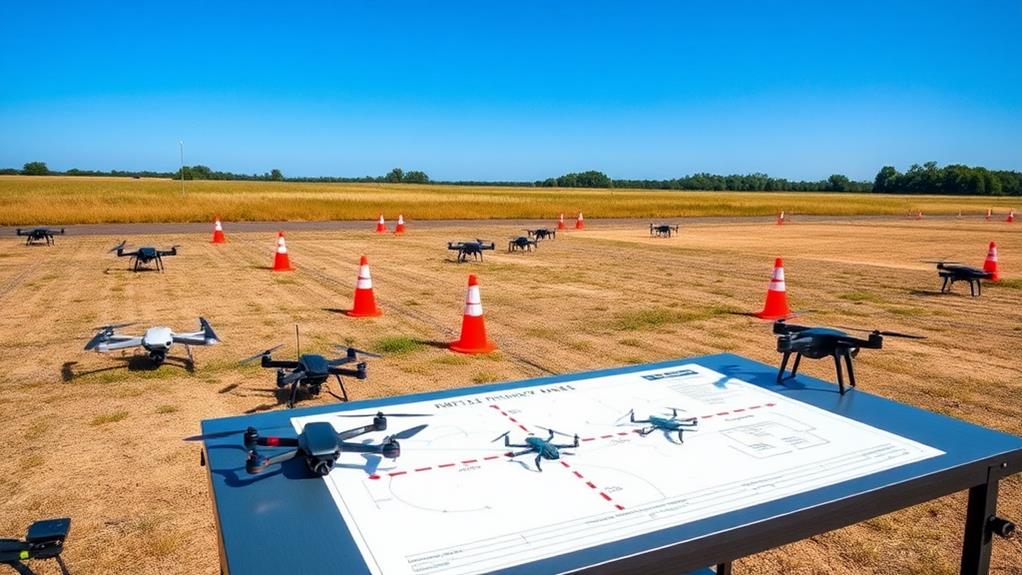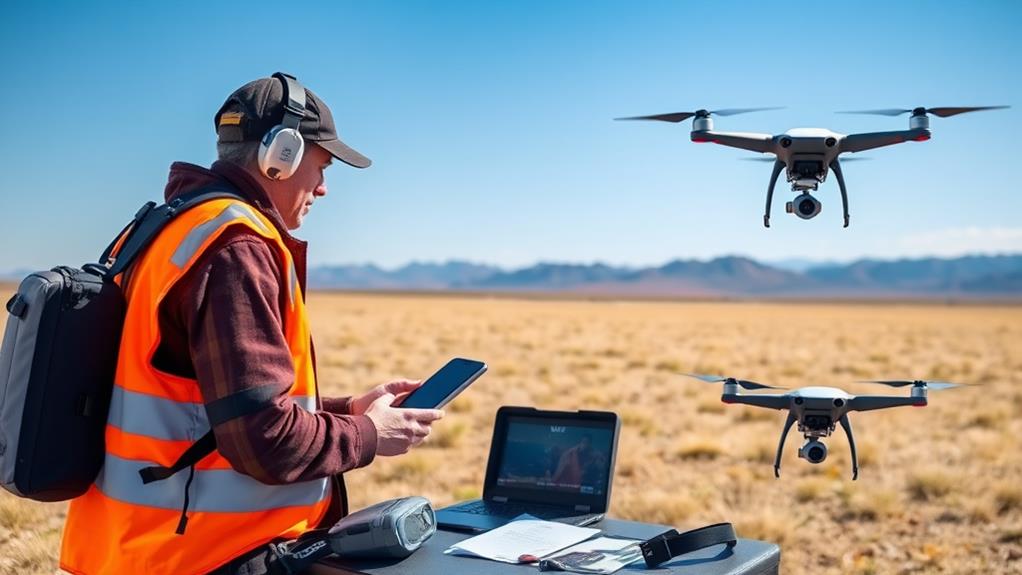When choosing top safety training courses for drone pilots, consider options like DRONERESPONDERS, which offers essential emergency training for $149, or Pilot Institute, featuring over 35 hours of thorough content for $159. USI's PRO certification is tailored for specific needs, helping you comply with FAA regulations. DARTdrones has a 99% success rate, indicating strong outcomes from their courses. Additionally, free resources from the FAASTeam can enhance your knowledge without cost. Prioritizing safety training not only reduces legal risks but also boosts your operational skills, making you a more competitive pilot in the industry, so there's more to explore.
Importance of Safety Training

In today's rapidly evolving drone industry, safety training is imperative for pilots. It not only helps you understand and comply with FAA regulations but greatly reduces the risk of legal penalties, which can reach fines of up to $250,000 for non-compliance.
By participating in extensive safety courses, you learn essential Standard Operating Procedures (SOPs) and risk management strategies, enhancing both your operational safety and efficiency. Additionally, a solid foundation in important drone safety guidelines can help pilots navigate complex flying environments effectively, thereby reducing accident rates.
Moreover, training programs often include specific modules on human factors and fatigue management, which are critical for maintaining high levels of alertness and effective decision-making during flight operations.
Specialized safety certifications, like USI's Primary PRO certification, validate your expertise in safe drone operations, making you more appealing to potential employers in a competitive job market.
Continuous education in safety practices guarantees that you stay updated on the latest industry standards and technological advancements. This commitment fosters a culture of safety and professionalism within the field, ultimately benefiting everyone involved.
Prioritizing safety training isn't just a regulatory requirement; it's a fundamental aspect of becoming a skilled, responsible drone pilot who contributes positively to the industry.
Overview of Leading Courses
When considering safety training courses for drone pilots, it's crucial to look at the course content, certification standards, and real-world applications.
Each program, like USI's foundational PRO certification or DARTdrones' customized training, offers unique insights tailored to meet specific needs.
Understanding these elements will help you choose a course that not only enhances your skills but also guarantees compliance and safety in your operations.
Course Content Highlights
Numerous courses available for drone pilots focus on safety training and regulatory compliance, ensuring you're well-prepared for the skies.
For instance, the DRONERESPONDERS Part 107 & Public Safety COA Course caters specifically to emergency services, providing essential training for $149.
If you're aiming for a thorough understanding, Pilot Institute offers an extensive Part 107 Commercial Drone License Course, featuring 514 lessons and 35 hours of video content for just $159.
DARTdrones stands out with a remarkable 99% success rate and over 9,000 students trained, providing safety training materials that include 300+ practice questions and a 50-page study guide at an affordable price of $30.
The FAA Safety Team (FAASTeam) also offers free training courses, enhancing your operational knowledge while ensuring compliance with the Operations Over People rule for Part 107 remote pilots.
For those seeking specialized knowledge, Unmanned Vehicle University covers vital operational procedures and risk management techniques, with courses like the UAV Pilot Training Certificate available for $3,500.
These training courses equip you with the necessary skills to become a competent Commercial Drone Pilot while prioritizing safety.
Certification and Compliance Standards
Understanding certification and compliance standards is important for any aspiring drone pilot. To legally operate a drone for non-recreational purposes, you must obtain the FAA Remote Pilot Certificate. This certification guarantees you're familiar with safety training, compliance regulations, and operational best practices.
Courses like the DRONERESPONDERS Part 107 & Public Safety COA Course are excellent options if you're interested in emergency services, as they provide in-depth insights into operational safety protocols.
The FAA Safety Team offers additional courses, such as ALC-451, ALC-515, and ALC-677, which focus on enhancing your operational knowledge and guaranteeing compliance with current regulations. Obtaining industry-recognized certifications, like USI Safety Certifications, can further demonstrate your proficiency in safety management and operational competency, essential for scalable drone operations.
Moreover, continuous drone education is important because the FAA's Operations Over People rule mandates specific training before you can conduct night operations or fly over people. Staying updated on these standards not only keeps you compliant but also guarantees you operate your drone safely and effectively in various situations.
Practical Application Scenarios
Practical application scenarios in drone training are fundamental for developing real-world skills and competencies.
Courses like the DRONERESPONDERS Part 107 & Public Safety COA Course focus on safety protocols specifically tailored for emergency services, ensuring you're prepared for significant operations.
Additionally, NIST UAS Made Easy emphasizes risk management and safety procedures, equipping you with standardized training for public safety agencies.
Another important course is Visual Observer Essentials. This training highlights teamwork and communication, both key for reducing mission risks during drone operations.
If you're looking to operate at night, the Part 107 Night Training Course provides essential skills for safely maneuvering low-light conditions under FAA regulations.
Specialized Training Benefits

Specialized training for drone pilots offers invaluable benefits that can elevate your professional standing in the industry. By enhancing your operational skills, this training positions you as a top-tier professional, ready to tackle specific industry challenges.
You'll gain knowledge that addresses legal and regulatory requirements, ensuring you're compliant with the latest standards. Additionally, understanding drone racing safety protocols enhances your ability to operate safely and responsibly in various environments.
Engaging in continuous education, including safety training, keeps you competitive in a rapidly evolving field. This adaptability not only improves your marketability but also leads to long-term career growth.
With specialized skills, you can command higher service rates and negotiate better contracts, ultimately boosting your earning potential.
Moreover, specialized safety training considerably reduces legal risks during operations. By emphasizing adherence to FAA guidelines and airspace regulations, you'll operate with increased confidence and understanding.
This focus on safety isn't just about following rules; it's about ensuring you're prepared for any situation that may arise.
Compliance and Regulations
Compliance with FAA regulations is indispensable for every drone pilot, and you can't afford to overlook it. To legally operate your drone for non-recreational flying, you must obtain a Part 107 Remote Pilot certification. This certification not only demonstrates your knowledge of FAA regulations but also guarantees you understand the legal requirements involved in safe drone operation.
Additionally, all drones weighing between 0.55 lbs and 55 lbs must be registered with the FAA, which links the drone to its operator and promotes accountability in the skies the FAA regulates drone operations. Failing to comply can lead to significant penalties, including fines of up to $250,000 or even jail time. To avoid these consequences, engaging in specialized training programs is imperative. These programs cover airspace authorization and operational compliance, equipping you with the knowledge needed to navigate complex regulations.
Moreover, the FAA frequently updates its rules, making continuous education essential for staying informed. For instance, the Operations Over People rule, effective April 21, 2021, allows for specific night operations but requires designated training for compliance.
Hands-On Practical Training

Understanding regulations is crucial, but it's just the beginning of becoming a competent drone pilot. Hands-on practical training is where you'll truly enhance your skills and safety awareness. Many training programs, like USI's UAS Bootcamps, combine in-person flight exercises with theoretical instruction, giving you a well-rounded experience.
During practical training, you'll focus on developing Standard Operating Procedures (SOPs) and checklists, which guarantee consistency and safety in your drone operations. This structured approach helps you manage various scenarios you might encounter in the field.
Moreover, practical training emphasizes critical human factors, such as fatigue management, to maintain operational safety. By understanding how these factors affect your performance, you'll become a more reliable pilot.
Graduates of these hands-on courses are well-equipped with industry-relevant skills, greatly improving their employability and readiness for real-world drone missions.
You'll find that the blend of theory and practice not only boosts your operational skills but also prepares you for the challenges that lie ahead. In short, engaging in practical training is a crucial step toward becoming a successful and safety-conscious drone pilot.
Networking in the Industry
Networking in the drone industry plays an essential role in your career growth.
By participating in safety training courses, you can build professional relationships, collaborate on projects, and share valuable industry insights with fellow pilots.
These connections not only enrich your learning experience but also open doors to potential job opportunities and partnerships in this rapidly evolving field.
Building Professional Relationships
Building professional relationships in the drone industry can greatly boost your career. By participating in training programs, you can access valuable networking opportunities, connecting with peers and industry leaders. Engaging with fellow pilots during these specialized courses enhances your visibility and helps you develop a robust professional network.
Many drone training institutions foster professional communities where you can receive support and advice, essential for career advancement. Networking events organized by these institutions or industry associations provide a platform to build relationships that could lead to job opportunities and mentoring.
These connections can open doors to collaborations and joint ventures, expanding your prospects in the field. Moreover, completing courses and certifications greatly increases your credibility, making you a more attractive candidate to potential employers and collaborators.
As you build these relationships, you'll find that sharing knowledge and experiences with others in your network can lead to mutual growth and success. Embracing these opportunities not only enhances your skill set but also positions you as a credible and sought-after professional in the drone industry.
Collaborating on Projects
Through collaboration on projects, you can harness the power of your professional network to elevate your drone piloting career. Engaging in networking within the drone industry opens doors to valuable collaborations and joint ventures.
These partnerships can greatly enhance your career prospects, allowing you to work on shared projects that utilize resources and expertise from multiple sources.
Training programs like those at Drone School often facilitate connections with fellow pilots, creating a community that promotes knowledge exchange and professional growth.
By networking with industry experts, you can uncover freelance opportunities that improve your marketability, ultimately increasing your income potential.
Participating in networking events and forums keeps you updated on current trends and advancements, essential for staying competitive in the ever-evolving drone landscape.
Accessing a network of professionals not only provides insights and advice but also helps you navigate challenges and discover new areas of specialization within the industry.
Sharing Industry Insights
Establishing connections within the drone industry can be a game-changer for your career. By tapping into networking opportunities, you can form collaborations and joint ventures that enhance your visibility among peers.
Specialized training programs often serve as a gateway to these connections, fostering a supportive community where knowledge sharing thrives. Participating in these programs allows you to engage with fellow pilots, which can lead to valuable mentorship opportunities.
Experienced professionals can guide you through the complexities of the drone industry, helping you navigate challenges more effectively.
Moreover, industry events and workshops associated with training programs provide insights into emerging trends and technologies. By attending these events, you'll not only stay updated but also strengthen your network.
Engaging with a community of drone operators can greatly enhance your marketability. Referrals from your connections can open doors to increased service opportunities and compensation potential.
Ultimately, embracing networking in the drone industry is essential for your professional growth. As you build relationships, you gain access to a wealth of resources and knowledge that can propel your career forward.
Don't underestimate the power of connection; it's a key ingredient in your success as a drone pilot.
Cost and Accessibility Options

How can you guarantee that you receive quality safety training without breaking the bank? The good news is that there are several cost-effective options available for aspiring drone pilots.
For instance, specialized training courses like the DRONERESPONDERS Part 107 & Public Safety COA Course are priced around $149, making it accessible for those keen on public safety knowledge.
If you're looking for budget-friendly choices, consider free courses such as Public Safety COA Made Easy and Recreational Flying Made Easy, which offer foundational training at no cost.
Additionally, the FAA Safety Team (FAASTeam) provides several no-cost options, including ALC-451 for Part 61 certificate holders, ensuring compliance while remaining within budget.
Various online platforms, like DARTdrones and Pilot Institute, present flexible payment plans and bundle options, allowing you to save on overall course costs while still getting thorough training.
Many of these programs also offer lifetime access to materials, ensuring you have ongoing support without incurring extra fees after your initial payment.
Conclusion
To summarize, investing in safety training for drone pilots isn't just smart; it's essential. With courses designed to enhance your skills, guarantee compliance, and provide hands-on experience, you'll be well-prepared for the skies. Remember, even the Wright brothers took flight lessons before changing the world! By pursuing these courses, you're not only protecting yourself but also contributing to a safer drone community. So, take the leap and elevate your knowledge today.

Leave a Reply